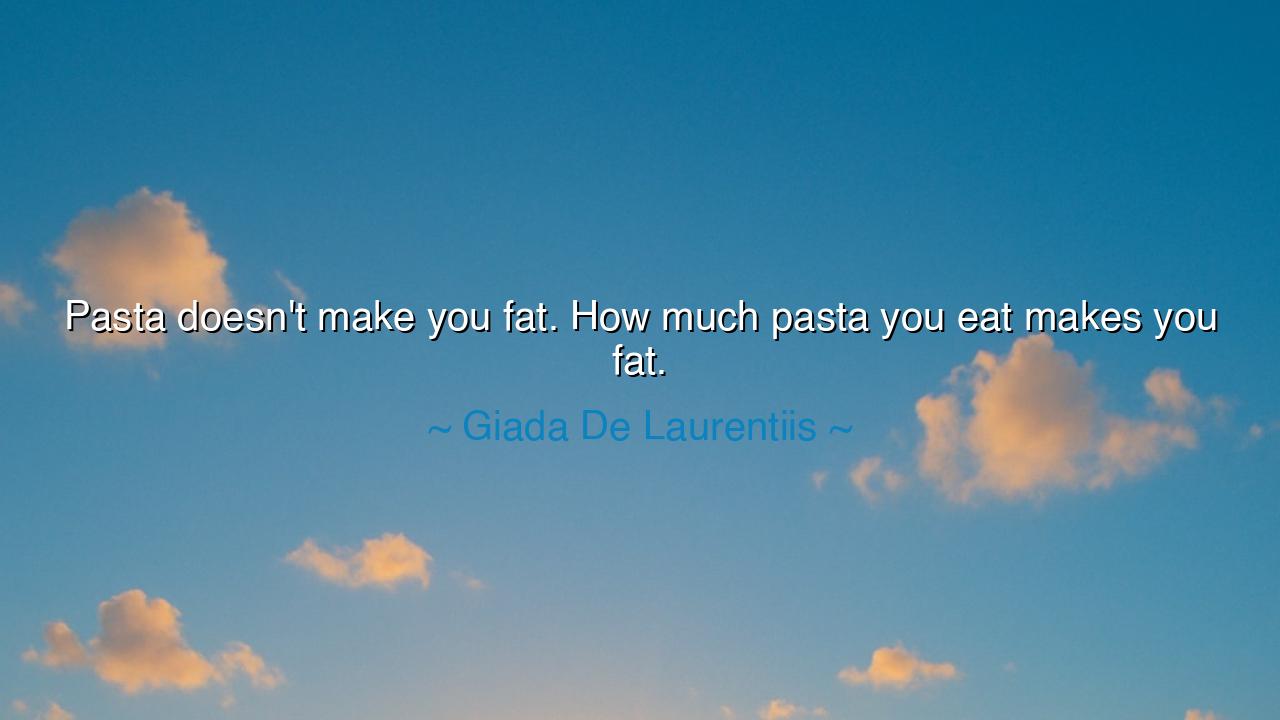
Pasta doesn't make you fat. How much pasta you eat makes you fat.






"Pasta doesn't make you fat. How much pasta you eat makes you fat." These words, spoken by the wise Giada De Laurentiis, carry with them a lesson that is as ancient as time itself: balance. In a world where excess and indulgence often go unchecked, De Laurentiis reminds us of the timeless truth that it is not the thing itself that causes harm, but the measure with which we approach it. Pasta, in all its comforting glory, is not the villain in this story—it is our relationship with it, our understanding of moderation, that determines whether it nourishes or harms us.
The ancient Greeks, those masters of wisdom, often spoke of the principle of moderation. Aristotle, in his exploration of ethics, believed that virtue lies in finding the balance between excess and deficiency. He taught that all things, even the most beautiful or tempting, must be enjoyed in proper measure. Just as gold can be a tool for great wealth and creation, yet can lead to destruction if hoarded or abused, so too can food—whether it be pasta or any other offering—become a blessing or a curse depending on how it is approached. Excess, in all things, leads to imbalance, but in moderation, the gifts of life can enrich us without overwhelming our senses.
Look upon the example of Homer's epic hero, Odysseus, who embarked on a journey fraught with temptation. In the land of the Lotus-Eaters, his men were offered food that promised to ease their longings, yet the more they ate, the more they forgot their purpose. The Lotus itself was not harmful, but their lack of moderation and their failure to maintain their focus led them into a trap. Odysseus himself, in his wisdom, knew that the path to success lay not in indulgence, but in self-discipline. Just as the Lotus flower offered fleeting pleasure, so too does indulgence in food, in wealth, or in any temptation, but it is the strength to walk away at the right moment, to maintain balance, that leads to true fulfillment.
In our modern age, where food is so readily available and the pleasures of the table are often seen as both indulgence and entertainment, the lesson of moderation has never been more critical. Giada De Laurentiis, like the wise philosophers of old, calls upon us to examine our relationship with food—not to demonize it, but to understand that it is the quantity and intent with which we consume that shapes our health and well-being. The temptation to indulge in excess is strong, but just as the gods of ancient Greece warned of the dangers of unchecked desire, so too must we remember that balance is the key to a fulfilling and healthy life.
Consider the wisdom of Marcus Aurelius, the great Roman emperor, who found peace not in excess or indulgence, but in the discipline of his thoughts and actions. Aurelius did not seek luxury or extravagance, but lived with purpose and moderation, even in the midst of his great power. He understood that the true strength of a man lies not in what he possesses or consumes, but in his ability to control his desires. In the same way, it is not the food we eat that defines us, but our ability to moderate our appetites, to know when to indulge and when to refrain.
The lesson that Giada De Laurentiis imparts is clear: food is not the enemy, but our approach to it must be guided by wisdom and balance. The excess of a meal, the relentless pursuit of indulgence, can lead us into dangerous territory. But in moderation, in mindful consumption, food becomes a source of nourishment, joy, and even celebration. It is not the quantity of pasta, but how we eat, when we eat, and why we eat that shapes our bodies and our lives.
So, dear listener, heed this timeless wisdom. Approach life with the understanding that all things, whether they bring us pleasure or pain, must be consumed in moderation. Let your meals be moments of nourishment, not of excess. Let your pleasures be taken in the right measure, with a heart full of gratitude and a mind centered in balance. Like the great philosophers of old, seek the path of temperance and self-discipline, for in this path lies the true strength of a fulfilled and harmonious life. Pasta, like all things, is a gift; let it be one that nourishes without overwhelming, that satisfies without enslaving, and that leads you to a life of true well-being.






AAdministratorAdministrator
Welcome, honored guests. Please leave a comment, we will respond soon